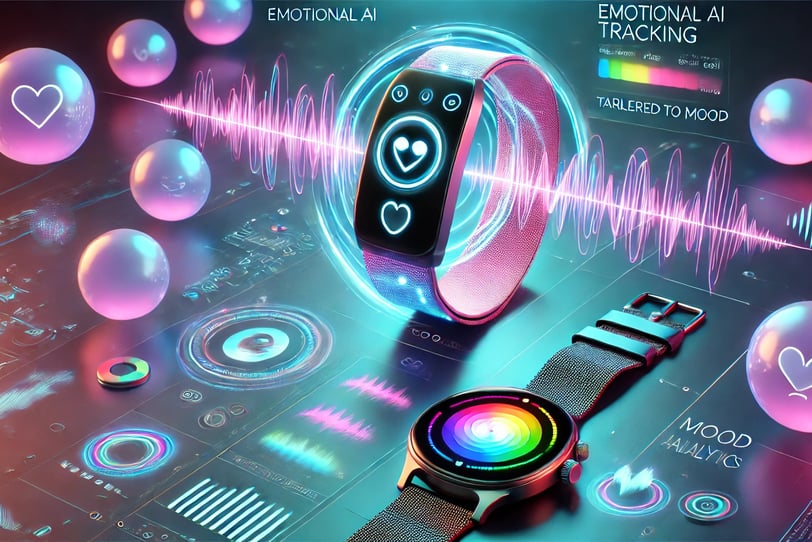Emotional AI: The Gadgets That Truly Understand You
Explore the fascinating world of Emotional AI and the gadgets that can sense and respond to your feelings. From wearable bands like FeelMo that track stress to AI-powered headphones that match music to your mood, discover how these groundbreaking technologies are transforming mental health, productivity, and even smart homes. Learn how Emotional AI is redefining human-technology interaction with empathetic and personalized experiences.


Introduction
What if your devices didn’t just respond to your commands but could understand your emotions? Imagine a world where your wearable gadgets sense your mood and provide solutions to help you relax, focus, or stay motivated. Emotional AI is transforming technology from a tool to a companion, paving the way for gadgets that are as empathetic as they are efficient.
In this blog, we’ll explore what Emotional AI is, examples of gadgets utilizing this groundbreaking technology, and how they’re already reshaping our daily lives.
1. What Is Emotional AI?
Emotional AI is a branch of artificial intelligence that enables devices to detect, analyze, and respond to human emotions. By processing data like voice tone, facial expressions, heart rate, and even breathing patterns, these gadgets aim to create a personalized experience tailored to your emotional state.
Key Technologies:
Biometric sensors to track physiological changes.
Voice analysis algorithms to detect stress or excitement.
AI models trained on facial expressions to identify emotions like happiness, sadness, or frustration.
2. Real-World Emotional AI Gadgets
Let’s dive into the cutting-edge gadgets that are bringing Emotional AI to life.
FeelMo Band
What It Does:
A sleek wearable band that tracks stress levels, monitors your heart rate variability, and provides real-time calming suggestions.
How It Works:
Biometric sensors measure physical stress indicators, while AI algorithms recommend breathing exercises or play soothing music.
Everyday Use:
Stressed before a meeting? FeelMo vibrates gently to prompt a mindfulness exercise.
Feeling anxious? It syncs with your favorite meditation app to guide you back to calmness.
Bose MoodSense Headphones
What It Does:
These AI-powered headphones analyze your voice tone and adjust the music to match—or elevate—your mood.
Why It’s Unique:
Play upbeat tracks to motivate you during workouts or soothing tunes to relax you after a long day.
Future Potential:
Integrated voice assistants could offer personalized affirmations or reminders based on emotional cues.
EmoWear Smartwatch
What It Does:
Tracks your mood throughout the day and creates a detailed emotional map.
Why It’s Transformative:
Provides insights into what triggers stress or happiness, helping you optimize your daily routine.
Real-Life Impact:
Helps professionals identify and manage burnout by providing actionable recommendations like breaks or exercise.
3. Everyday Applications of Emotional AI
Emotional AI gadgets aren’t just fancy tech—they’re transforming how we interact with technology and manage our lives.
1. Enhancing Mental Health
Wearables like FeelMo Band or MoodSense Headphones act as real-time mental health companions, reducing anxiety and stress levels with subtle interventions.
AI could recommend mental health exercises, suggest apps for therapy, or even connect you with a counselor.
2. Boosting Productivity
Imagine a gadget that knows when you're distracted or overwhelmed and suggests taking a break, drinking water, or switching tasks.
Emotional AI could integrate with workplace software to monitor collective stress levels and recommend solutions for teams.
3. Revolutionizing Smart Homes
Emotional AI can integrate with smart home ecosystems:
Lights dim when you’re feeling tired.
Thermostats adjust for comfort during stressful times.
Smart speakers like Alexa detect frustration and offer to simplify tasks.
4. The Future of Emotional AI
Emotional AI is just getting started. Here’s what we can expect in the near future:
Integration Into Everyday Devices:
From cars that detect road rage and play calming playlists to fridges that recommend comfort foods when you’re down.
AI-Driven Relationships:
Virtual companions with emotional intelligence could become friends, confidants, or even emotional support systems.
Healthcare Applications:
Early detection of mental health conditions through continuous emotional monitoring.
Challenges
Privacy Concerns: Emotional data is deeply personal, raising ethical questions about how companies collect and use this information.
Accuracy: Emotional AI is not yet perfect, and misinterpretations could lead to inappropriate responses.
5. Conclusion
Emotional AI is a bold step toward humanizing technology. By detecting and responding to our emotions, these gadgets offer more personalized, empathetic, and impactful experiences. As this technology evolves, it has the potential to improve mental health, productivity, and even relationships, making our gadgets not just tools but partners.
Call-to-Action
🌟 "Which Emotional AI gadget excites you the most? Share your thoughts in the comments below!"
📬 "Don’t forget to subscribe to Tech Insights Hub for the latest updates on AI and tech trends shaping the future!"
